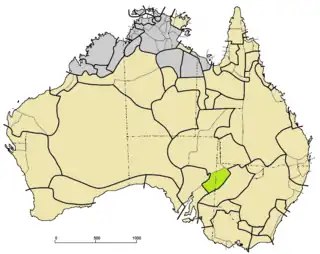Yarli language
Yarli (Yardli) was a dialect cluster of Australian Aboriginal languages spoken in northwestern New South Wales and into Northeastern South Australia individually Malyangapa (Maljangapa), Yardliyawara, and Wadikali (Wardikali, Wadigali). Bowern (2002) notes Karenggapa as part of the area, but there is little data.
| Yarli | |
|---|---|
| Region | Northwestern New South Wales |
| Ethnicity | Malyangapa, Yardliyawara, Wadikali, Karenggapa |
Native speakers | possibly extinct; 2 speakers in 1987 (2004)[1] Malyangapa extinct 1976 with the death of Laurie Quayle. Wadikali extinct before that.[1] |
Pama–Nyungan
| |
| Dialects |
|
| Latin | |
| Language codes | |
| ISO 639-3 | Variously:yxl – Yardliyawarrayga – Malyangapawdk – Wadikali (Malyangapa dialect) |
| Glottolog | yarl1236 |
| AIATSIS[2] | L8 Malyangapa, L7 Yardliyawara |
| ELP | |
 Yardli languages (green) among other Pama–Nyungan (tan) | |
Tindale (1940) groups Wanjiwalku & Karenggapa together with Wadikali & Maljangapa as the only languages in NSW that are behind the 'Rite of Circumcision' border - which suggests Wanjiwalku to also be part of the Yarli area.
Classification
The three varieties are very close. Hercus & Austin (2004) classify them as the Yarli branch of the Pama–Nyungan family. Dixon (2002) regards the three as dialects of a single language. Bowern (2002) excludes them from the Karnic languages, where they had sometimes been classified.
References
- Yardliyawarra at Ethnologue (18th ed., 2015) (subscription required)
Malyangapa at Ethnologue (18th ed., 2015) (subscription required)
Wadikali (Malyangapa dialect) at Ethnologue (18th ed., 2015) (subscription required) - L8 Malyangapa at the Australian Indigenous Languages Database, Australian Institute of Aboriginal and Torres Strait Islander Studies (see the info box for additional links)
- Dixon, R. M. W. (2002). Australian Languages: Their Nature and Development. Cambridge: Cambridge University Press. xxxvii.
- Hercus, Luise; Austin, Peter (2004). "The Yarli Languages". In Claire Bowern and Harold Koch (ed.). Australian Languages: Classification and the Comparative Method. Amsterdam/Philadelphia: John Benjamins Publishing Company. pp. 207–222.